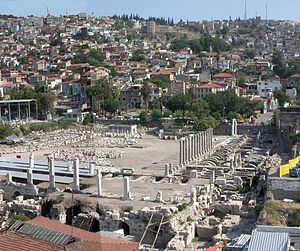Agora: Difference between revisions
imported>David Martin No edit summary |
Pat Palmer (talk | contribs) (adding an image) |
||
| (14 intermediate revisions by 8 users not shown) | |||
| Line 1: | Line 1: | ||
{{ | {{subpages}} | ||
{{Image|Agora of Smyrna.jpg|right|300px|Remains of the sgora in the ancient Greek city of Smyrna.}} | |||
An '''agora''' ({{polytonic|ἀγορά}}), meaning "marketplace" in English, was a place in an [[ancient Greece|ancient Greek]] [[polis]] or city-state that played the role of both [[market (economics)|market]] and also a [[forum]] for citizens. The agora was already a part of a [[city]] by the time of [[Homer]] (circa [[8th century BC]]). The agora developed with the establishment of city-states after the [[Mycenae]]an civilization fell. | |||
The most famous agora was the one in [[Athens]]. The [[Agora Open Air Museum of Izmir]] is one of the best preserved agorae in the world. An agora is often surrounded by [[colonnade]]s. | |||
[[ | The word [[agoraphobia]], derives from ''agora'', and denotes a fear of public spaces, such as the marketplace. | ||
Agora also means a place of assembly in any Ancient Greek state. It is sometimes used in modern language to refer to a ''crossroads'', either metaphorically (the point or concept which links, or ''is the crossroads of'' multiple related concepts), or literally, a point at which many physical roads or paths meet.[[Category:Suggestion Bot Tag]] | |||
Agora also means a place of assembly in any Ancient Greek state. It is sometimes used in modern language to refer to a ''crossroads'', either metaphorically (the point or concept which links, or ''is the crossroads of'' multiple related concepts), or literally, a point at which many physical roads or paths meet. | |||
[[Category: | |||
Latest revision as of 12:51, 16 August 2024
An agora (ἀγορά), meaning "marketplace" in English, was a place in an ancient Greek polis or city-state that played the role of both market and also a forum for citizens. The agora was already a part of a city by the time of Homer (circa 8th century BC). The agora developed with the establishment of city-states after the Mycenaean civilization fell.
The most famous agora was the one in Athens. The Agora Open Air Museum of Izmir is one of the best preserved agorae in the world. An agora is often surrounded by colonnades.
The word agoraphobia, derives from agora, and denotes a fear of public spaces, such as the marketplace.
Agora also means a place of assembly in any Ancient Greek state. It is sometimes used in modern language to refer to a crossroads, either metaphorically (the point or concept which links, or is the crossroads of multiple related concepts), or literally, a point at which many physical roads or paths meet.
